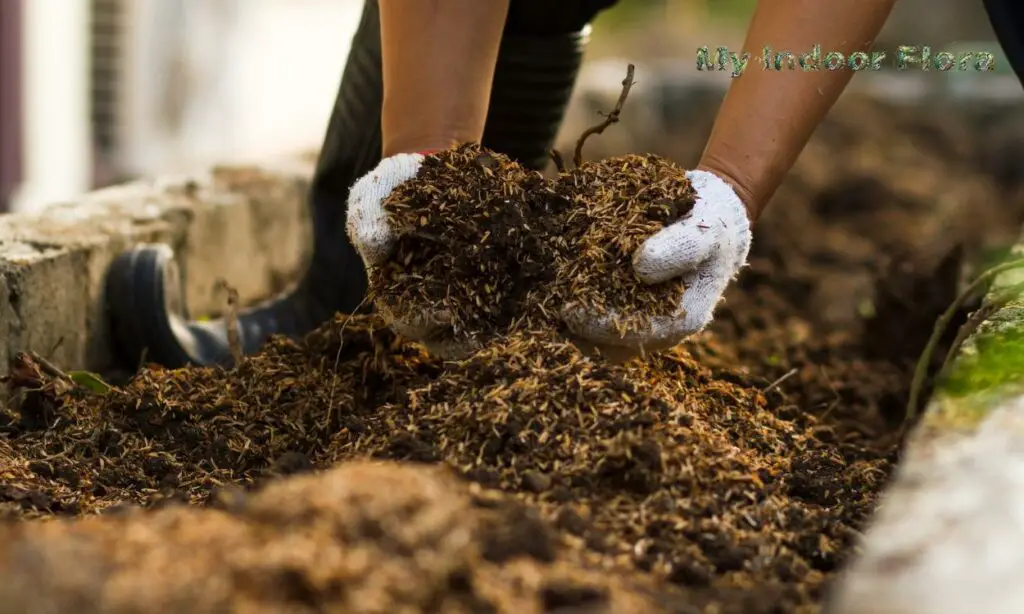Introducing the world of organic potting mixes: a game-changer for houseplant enthusiasts who prioritize healthy plant growth, environmental sustainability, and improved indoor air quality. Organic potting mixes have gained immense popularity due to their ability to provide a balanced, nutrient-rich environment that supports healthy root systems, increases resistance to pests and diseases, and contributes to better air purification.
In fact, a study published in the Journal of Environmental Horticulture found that plants grown in organic potting mixes were more effective at removing volatile organic compounds (VOCs) from the air compared to those grown in synthetic mixes. Composed of natural, biodegradable materials like peat moss or coco coir, compost, perlite or vermiculite, and organic fertilizers, these mixes cater to a diverse range of houseplants and their unique needs.
In this comprehensive guide, we’ll explore the many benefits of organic potting mixes, their essential components, and how to create your own mix for a thriving indoor garden.
Why Organic Potting Mixes are the Preferred Choice for Houseplants?
Organic potting mixes have gained popularity among indoor gardeners for several reasons. These mixes provide a balanced, nutrient-rich environment that promotes healthy plant growth, is environmentally sustainable, and improves indoor air quality.

Promoting Healthy Plant Growth
Organic potting mixes are rich in nutrients and essential elements that houseplants need to grow and thrive. Research has shown that plants grown in organic mixes exhibit stronger root systems, increased resistance to pests and diseases, and better overall health compared to those grown in synthetic potting mixes.
Environmental Sustainability
Choosing organic potting mixes contributes to a healthier environment by reducing the use of synthetic chemicals and non-renewable resources. Organic potting mixes are made from natural, biodegradable materials, which can be composted or returned to the earth at the end of their life cycle. This closed-loop system helps reduce waste and minimize the environmental impact of indoor gardening.
Improving Indoor Air Quality
Houseplants play a vital role in purifying the air by absorbing harmful pollutants such as volatile organic compounds (VOCs) and carbon dioxide. Organic potting mixes can further enhance this air-purifying effect. A study published in the Journal of Environmental Horticulture found that plants grown in organic potting mixes were more effective at removing VOCs from the air compared to those grown in synthetic mixes. This improvement in air quality can contribute to a healthier living environment, especially in urban areas where outdoor air quality may be poor.
Essential Components of an Organic Potting Mix
A high-quality organic potting mix typically contains a blend of natural ingredients that provide the necessary nutrients, moisture retention, and drainage for houseplants. Some of the key components are given below.
Peat Moss or Coco Coir
Peat moss or coco coir serves as the base for most organic potting mixes. These materials are excellent at retaining moisture, yet they also allow for proper drainage and aeration. Peat moss is harvested from peat bogs, whereas coco coir is derived from the husks of coconuts. Both options are renewable, though coco coir is often considered more sustainable due to the environmental concerns associated with peat harvesting.
Compost
Compost is a crucial ingredient in organic potting mixes, providing essential nutrients and organic matter that promote healthy plant growth. High-quality compost is made from decomposed organic materials, such as leaves, kitchen scraps, and manure, which are broken down by microorganisms into nutrient-rich humus. Adding compost to a potting mix increases water retention, improves soil structure, and supplies plants with vital nutrients.
Perlite and Vermiculite
Perlite and vermiculite are both naturally occurring minerals that are heated to create lightweight, porous granules. These materials are added to organic potting mixes to improve drainage, aeration, and moisture retention. Perlite is made from volcanic glass, while vermiculite is a mineral from the mica family. Both materials are inert and will not affect the pH or nutrient levels in the mix.
Organic Fertilizers
Organic fertilizers are derived from natural sources, such as bone meal, blood meal, or seaweed, and provide essential nutrients to houseplants. They release nutrients slowly, allowing plants to absorb them over time, which can lead to healthier growth and development. Organic fertilizers also support beneficial microorganisms in the potting mix, contributing to a healthy soil ecosystem.
Water Retention and Drainage in Organic Potting Mixes
One of the key benefits of using organic potting mixes is their ability to balance water retention and drainage, ensuring that houseplants receive the right amount of moisture without becoming waterlogged.
Balancing Moisture Retention and Drainage
Organic potting mixes contain ingredients that work together to create a balanced environment for houseplants. Peat moss or coco coir and compost help retain moisture, while perlite and vermiculite improve drainage and aeration. This balance prevents overwatering and ensures that plant roots have access to the necessary oxygen, promoting strong root growth and overall plant health.
Preventing Overwatering and Root Rot in Houseplants
Overwatering is a common issue faced by indoor gardeners, and it can lead to root rot and other diseases. Organic potting mixes can help prevent these problems by providing a well-draining medium that allows excess water to escape while maintaining adequate moisture levels. This balance supports healthy root development and minimizes the risk of waterlogged soil and root rot.
Supporting Beneficial Microorganisms in Organic Potting Mixes
A healthy soil ecosystem is essential for strong, resilient houseplants. Organic potting mixes support the growth of beneficial microorganisms that contribute to soil health and plant growth.
Improving Soil Health with Beneficial Microorganisms
Organic potting mixes are teeming with beneficial microorganisms, such as bacteria, fungi, and protozoa, which help break down organic matter and release nutrients for plant uptake. These microorganisms also improve soil structure, making it more porous and aerated, allowing roots to grow and access nutrients more easily.
The Role of Microorganisms in Nutrient Cycling and Plant Growth
Beneficial microorganisms play a vital role in nutrient cycling by breaking down complex organic compounds into simpler forms that plants can absorb. This process, known as mineralization, ensures that houseplants receive a continuous supply of nutrients for optimal growth. In addition, some microorganisms form symbiotic relationships with plant roots, improving nutrient uptake and enhancing the plant’s natural defenses against pests and diseases.
Pest and Disease Resistance in Houseplants using Organic Potting Mixes
Organic potting mixes can contribute to stronger, more resilient houseplants by enhancing their resistance to pests and diseases.
Minimizing the Risk of Pest Infestations
Healthy plants are less susceptible to pest infestations, and organic potting mixes promote plant health by providing the right balance of nutrients, moisture, and aeration. Additionally, beneficial microorganisms in organic mixes can help suppress soil-borne pathogens and compete with harmful pests for resources, reducing the likelihood of infestations.
Enhancing the Natural Defense Mechanisms of Houseplants against Diseases
Organic potting mixes support the growth of beneficial microorganisms that can boost the immune system of houseplants. For instance, certain species of bacteria and fungi produce natural antibiotics that protect plants from harmful pathogens. These beneficial organisms can also elicit an immune response in plants, helping them develop stronger resistance to diseases.
Special Considerations for Specific Types of Houseplants
While organic potting mixes provide a suitable growing medium for most houseplants, it’s essential to consider the unique requirements of specific plant types to ensure their success.
Customizing Organic Potting Mixes for Different Houseplant Requirements
Certain houseplants may require specific adjustments to the organic potting mix to better meet their needs. For example, acid-loving plants like azaleas and gardenias may benefit from a mix with added sphagnum peat or a more acidic compost. On the other hand, succulents and cacti prefer a well-draining mix with a higher percentage of perlite or sand to prevent overwatering and root rot.
Organic Potting Mixes for Tropical Plants, Succulents, and Cacti
Tropical plants typically thrive in a moist, well-draining organic potting mix that contains a high percentage of peat moss or coco coir, compost, and perlite. This combination provides the right balance of moisture retention and drainage to support the lush growth of these plants.
Succulents and cacti, however, require a different approach. They need a fast-draining mix that retains less moisture. To achieve this, increase the ratio of perlite, vermiculite, or coarse sand in the organic potting mix. You can also consider adding horticultural charcoal, which helps to improve drainage and prevent the growth of harmful fungi.
Making Your Own Organic Potting Mix at Home
Creating a customized organic potting mix at home allows you to tailor the mix to your houseplants’ specific needs while ensuring high-quality, natural ingredients.
Basic Ingredients and Proportions for a Homemade Organic Potting Mix
A simple recipe for a homemade organic potting mix includes:
- 40% peat moss or coco coir
- 30% compost
- 20% perlite or vermiculite
- 10% organic fertilizer
Mix these ingredients thoroughly to create a well-blended, nutrient-rich potting mix suitable for most houseplants.
Adjusting the Homemade Organic Potting Mix for Different Houseplant Needs
To customize your homemade organic potting mix for specific plant types, consider the following adjustments:
- For acid-loving plants: Add sphagnum peat or acidic compost and reduce the percentage of other compost materials.
- For succulents and cacti: Increase the percentage of perlite, vermiculite, or coarse sand, and consider adding horticultural charcoal.
- For tropical plants: Increase the percentage of peat moss or coco coir and perlite for better moisture retention and drainage.
Conclusion
Organic potting mixes offer numerous benefits for houseplants, contributing to their overall health and well-being. By understanding the essential components of these mixes and how they support plant growth, you can create the ideal environment for your indoor garden. With the right mix and a little care, your houseplants will thrive, providing you with cleaner air, improved aesthetics, and a sense of accomplishment as you watch them grow.
